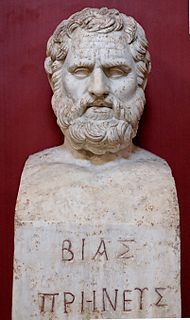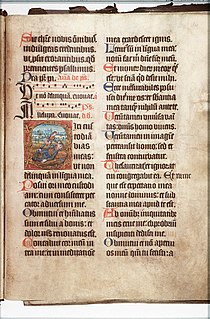Lucius Annaeus Seneca the Elder, also known as Seneca the Rhetorician, was a Roman writer, born of a wealthy equestrian family of Corduba, Hispania. He wrote a collection of reminiscences about the Roman schools of rhetoric, six books of which are extant in a more or less complete state and five others in epitome only. His principal work, a history of Roman affairs from the beginning of the Civil Wars until the last years of his life, is almost entirely lost to posterity. Seneca lived through the reigns of three significant emperors; Augustus, Tiberius and Caligula. He was the father of Lucius Junius Gallio Annaeanus, best known as a Proconsul of Achaia; his second son was the dramatist and Stoic philosopher Seneca the Younger (Lucius), who was tutor of Nero, and his third son, Marcus Annaeus Mela, became the father of the poet Lucan.

The gens Lucilia was a plebeian family at ancient Rome. The most famous member of this gens was the poet Gaius Lucilius, who flourished during the latter part of the second century BC. Although many Lucilii appear in Roman history, the only one known to have obtained any of the higher offices of the Roman state was Lucilius Longus, consul suffectus in AD 7.

Justus Lipsius was a Flemish Catholic philologist, philosopher, and humanist. Lipsius wrote a series of works designed to revive ancient Stoicism in a form that would be compatible with Christianity. The most famous of these is De Constantia. His form of Stoicism influenced a number of contemporary thinkers, creating the intellectual movement of Neostoicism. He taught at the universities in Jena, Leiden, and Leuven.

Bias of Priene was a Greek sage. He is widely accepted as one of the Seven Sages of Greece and was renowned for his probity.

Cato Maior de Senectute is an essay written by Cicero in 44 BC on the subject of aging and death. To lend his reflections greater import, Cicero wrote his essay such that the esteemed Cato the Elder was lecturing to Scipio Africanus and Gaius Laelius Sapiens.
Hecato or Hecaton of Rhodes was a Greek Stoic philosopher.
Indirect speech, also known as reported speech, indirect discourse (US), or ōrātiō oblīqua, is the practice, common in all Latin historical writers, of reporting spoken or written words indirectly, using different grammatical forms. Passages of indirect speech can extend from a single phrase to an entire paragraph, and this style was generally preferred by Roman historians to the direct speech commonly found in Greek authors.

Totus tuus was routinely used to sign off letters written in Latin, meaning "all yours", often abbreviated as "t.t.". In recent history Totus tuus was used by Pope John Paul II as his personal motto to express his personal Consecration to Mary based on the spiritual approach of Louis de Montfort and the Mariology in his works. The pontiff explained the meaning further in his book Crossing the Threshold of Hope where he defines it as not only an expression of piety but also of devotion that is deeply rooted in the Mystery of the Blessed Trinity.
Neostoicism was a philosophical movement that arose in the late 16th century from the works of Justus Lipsius, that sought to combine the beliefs of Stoicism and Christianity. Lipsius was Flemish and a Renaissance humanist. The movement took on the nature of religious syncretism, although modern scholarship does not consider that it resulted in a successful synthesis. The name "neostoicism" is attributed to two Roman Catholic authors, Léontine Zanta and Julien-Eymard d'Angers.

Nihil admirari is a Latin phrase. It means "to be surprised by nothing", or in the imperative, "Let nothing astonish you".
De Oratore, Book III is the third part of De Oratore by Cicero. It describes the death of Lucius Licinius Crassus.

Psalm 39 is the 39th psalm of the Book of Psalms, beginning in English in the King James Version: "I said, I will take heed to my ways, that I sin not with my tongue". The Book of Psalms is part of the third section of the Hebrew Bible, and a book of the Christian Old Testament. In the slightly different numbering system used in the Greek Septuagint and Latin Vulgate translations of the Bible, this psalm is Psalm 38. In Latin, it is known as "Dixi custodiam vias meas". It is a meditation on the fragility of man before God, ending in a prayer for a peaceful life.

Otium, a Latin abstract term, has a variety of meanings, including leisure time in which a person can enjoy eating, playing, relaxing, contemplation and academic endeavors. It sometimes, but not always, relates to a time in a person's retirement after previous service to the public or private sector, opposing "active public life". Otium can be a temporary time of leisure, that is sporadic. It can have intellectual, virtuous or immoral implications. It originally had the idea of withdrawing from one's daily business (neg-otium) or affairs to engage in activities that were considered to be artistically valuable or enlightening. It had particular meaning to businessmen, diplomats, philosophers and poets.

Tristis est anima mea is the second responsory of the Tenebrae for Maundy Thursday. The Latin text refers to Christ's Agony in the Garden of Gethsemane, a part of his Passion.
Latin syntax is the part of Latin grammar that covers such matters as word order, the use of cases, tenses and moods, and the construction of simple and compound sentences, also known as periods.

De Constantia Sapientis is a moral essay written by Seneca the Younger, a Roman Stoic philosopher, sometime around 55 AD. The work celebrates the imperturbility of the ideal Stoic sage, who with an inner firmness, is strengthened by injury and adversity.
Latin word order is relatively free. The subject, object, and verb can come in any order, and an adjective can go before or after its noun, as can a genitive such as hostium "of the enemy". A common feature of Latin is hyperbaton, in which a phrase is split up by other words: Sextus est Tarquinius "it is Sextus Tarquinius".
Latin has six main tenses: three non-perfect tenses and three perfect tenses. In technical language, the first three tenses are known as the īnfectum tenses, while the three perfect tenses are known as perfectum. The two sets of tenses are made using different stems. For example, from the verb faciō 'I do' the three non-perfect tenses are faciō, faciam, faciēbam 'I do, I will do, I was doing', made with the stem faci-, and the three perfect tenses are fēcī, fēcerō, fēceram 'I did, I will have done, I had done', made with the stem fēc-.
A temporal clause is an adverbial clause of time, that is to say, a clause which informs the reader about the time when the action of main verb of the sentence occurred. So in a sentence such as "after I had said this, he went out", the first clause is a temporal clause. The name comes from the Latin word tempus, genitive temporis, 'time".
Conditional clauses in Latin are clauses which start with the conjunction sī 'if' or the equivalent. The 'if'-clause in a conditional sentence is known as the protasis, and the consequence is called the apodosis.










